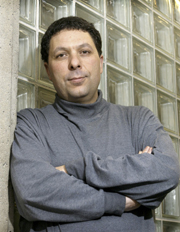
Meir Amor teaches a course on ethnic and race relations.
Photo by Andrew Dobrowolskyj
|
by Frank
Kuin
Canada has made more progress in embracing cultural diversity than any
other country in the world, and stands as a unique example internationally
for the peaceful way in which its internal differences are dealt with,
says Meir Amor, a new assistant professor of sociology at Concordia.
Looking at Canada as an expert on ethnic and race relations, Amor finds
that this country has made great strides in “breaking open new patterns”
to debate the rights and claims of cultural, linguistic and ethnic minorities.
Often, such issues “are not so much debated in many other societies.”
In comparison to other nations, even similar ones such as the United States
and Australia, Canada has in the last 50 years or so fostered “a
serious effort,” both formally and within society at large, “to
come up with innovative methods to deal with diversity,” Amor said.
“We are engaging diversity in a way that is quite unique.” He
summarized the components of the Canadian way as moderation, non-violence
and recognition of the rights of others.
Accommodating difference
Indeed, the great lesson that can be learned from studying Canada’s
achievements is that there are ways to deal with differences non-violently.
Amor grew up in Israel and has studied several historical cases of genocide
and mass expulsion in his PhD research at the University of Toronto.
“You can compare the path that Canada is going with different paths
that other societies went,” he said. “The huge difference is
that they opted in some cases for violence and extermination. And in Canada
we are still juggling and trying to accommodate the different claims.”
These claims, such as that over the place of Quebec in Canada, the status
of native people and the emancipation of ethnic minorities, have nurtured
“a need to make room and share,” he said. “And making room
and sharing is not an easy thing to do.”
Amor dismissed suggestions that the differences Canadians face are somehow
less intractable than those bedevilling more conflict-prone regions of
the world. In fact, Canada has “all the ingredients” for conflicts
that might have erupted into violence, he said.
For instance, the Irish example shows what differences between Protestants
and Catholics can lead to, while contrasts of languages have brought violence
to many other places. And demands for land, such as native claims in Canada,
have elsewhere led to shooting wars.
Thus, Canadians can take some credit for their maintenance of peaceful
dialogue. As Amor noted, we have embraced a practice, rather than an ideology,
of non-violence.
“Canadians learned to share not because they are nice,” he argued.
Rather, the key to the Canadian success is that there is a tacit, or even
an explicit acknowledgement that going together might be more beneficial
than going it alone. In addition, Canada has abundance of resources that
it can share.”
As a result, “violence does not emerge as an option, whereas in other
cases, violence was almost the first choice.”
Amor, who teaches a course in race and ethnic relations, has a keen personal
interest in the conflict between Israelis (or Israel and Palestine) and
the Palestinians. While he emphasized that the circumstances in the Middle
East differ from those in Canada, he argued that at a basic level, the
Canadian example of recognizing a “reality of co-existence”
is valuable in that context as well.
“To put the conflict in very straightforward parameters, you’re
speaking about 12 million people who are divided into two national groups,
which both have a strong attachment to the land,” he said. “Basically,
there are two ways to deal with this strong attachment: you can either
share the land or you can fight over it.”
Stressing that there is no symmetry of power between the two sides, and
Israel is the occupier, Amor condemned leaders on both sides for condoning
violence. He also rejected a tendency, even within the Concordia community,
to see the conflict in terms of “either-or.”
Rather, he argued, “the reality in Israel is that in order to be
pro-Israeli, you have to [also] be pro-Palestinian, and vice versa. The
destinies of these two nations are very much intertwined. Many, of course,
resent and reject this reality. So we have an endless bloodshed.”
However, “the option of sharing is there, and people know it.”
|
|
|




